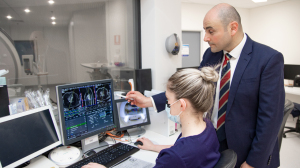by
John R. Fischer, Senior Reporter | June 10, 2022

Virtual MR may potentially be an alternative to most invasive biopsies for detecting signs of heart transplant rejection. (Photo courtesy of Victor Chang Cardiac Research Institute)
A new MR technique may one day replace most invasive biopsies with virtual ones to determine the likelihood of rejection in heart transplant patients.
While highly successful, a small percentage of these people die in the first year following surgery. Australian researchers at the Victor Chang Cardiac Research Institute and St. Vincent’s Hospital in Sydney say their approach uses MR to assess heart oedema levels, which are closely linked to heart inflammation, and has accurately detected signs of rejection.
If successful, they say it could reduce rejection, other complications and hospital admissions. “MR has the unique capability of characterizing the structure of heart muscle. It can detect inflammation, scarring and swelling. This technique will replace the vast majority of invasive biopsies currently done to detect heart rejection,” Andrew Jabbour, associate professor at the Institute, told HCB News.



Ad Statistics
Times Displayed: 47931
Times Visited: 1475 MIT labs, experts in Multi-Vendor component level repair of: MRI Coils, RF amplifiers, Gradient Amplifiers Contrast Media Injectors. System repairs, sub-assembly repairs, component level repairs, refurbish/calibrate. info@mitlabsusa.com/+1 (305) 470-8013
Invasive biopsies involve inserting a tube and removing samples of heart tissue to test immunosuppressive treatments. In addition to being uncomfortable, the procedure can lead to rare but serious complications if the heart is perforated or a valve is damaged. Patients also usually require 12 of these the first year after their transplant.
At random, the scientists performed traditional biopsies and virtual MR ones on 40 patients. Their approach had similar immunosuppression requirements, kidney function and mortality rates, but reduced hospitalization and infections. And just 6% of these patients required an additional biopsy.
Jabbour and his colleagues plan to use their method along with blood tests to assess cardiac biomarkers and gene expression profiling. “Further research is underway around the world and locally. Regulatory approval is very likely in the future,” said Jabbour.
The findings were published in
Circulation.

